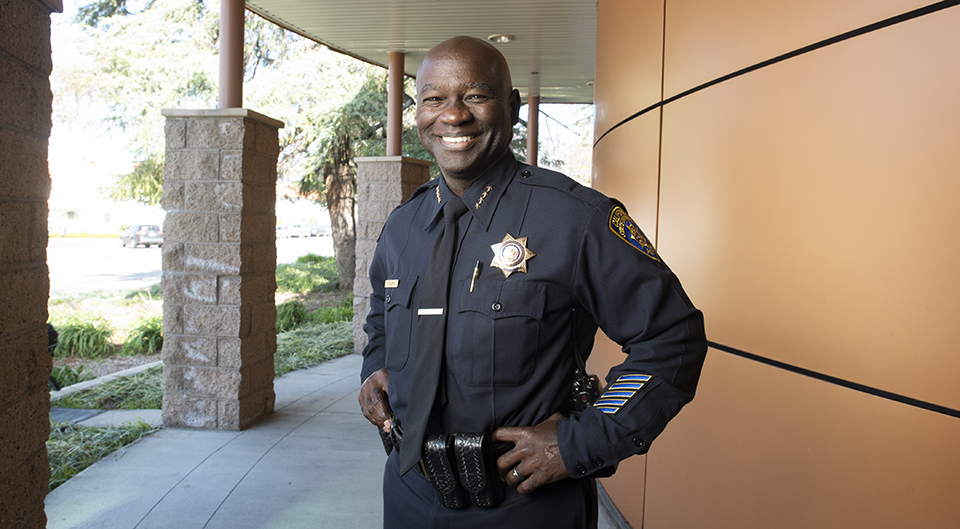Gregory Murphy Joins CSUN Community as its New Police Chief

Gregory Murphy Joins the CSUN community as its new police chief. Photo by Lee Choo.
When Gregory Murphy was introduced earlier this month as California State University, Northridge’s new police chief and initially addressed the members of the CSUN Department of Police Services, the topic of his conversation was respect. Respect also is a theme that he wants to define his relationship with the campus community.
“I shared with the staff that the most important thing is how we treat each other, that we treat each other with respect,” Murphy said. “I believe that if we are constantly and routinely practicing that internally, it will naturally carry over to how we interact with the community. We can’t get away from the fact that if we treat people with respect, with compassion and empathy, we are going to be more successful overall in achieving our goals.”
Murphy, 56, took the mantle of CSUN’s top law enforcement official Jan. 7. He comes to the campus from the University of California, San Diego, where he served as the assistant chief of police.
Murphy has extensive law enforcement experience that includes campus and municipal policing, as well as police training and standards oversight at the statewide level. In addition to his time at UC San Diego, he served as a lieutenant, chief, and sergeant at the University of California at Davis, Sierra Community College and with the Los Angeles Police Department (LAPD) respectively, and as a training professional with the California Commission on Police Officer Standards and Training (POST).
Murphy said one of his goals as CSUN’s new police chief is to increase the use of technology by the department to achieve community policing efforts.
“I want to leverage the use of technology as a means to communicate with the community, as well as a tool to prevent, intervene and investigate crimes,” he said.
When Murphy graduated from high school and started college, he did so with the intention of becoming an engineer. About midway through, Murphy said he realized engineering was not for him, and joined the US Air Force in an effort to find himself and serve the nation. He spent six years in the Air Force, specializing in missile systems and computer operations/programming. He also completed a bachelor’s degree in computer science from Park University in Maryland while serving.
“After my experience in the Air Force, I realized that public service was a rewarding feeling, law enforcement was a way that I could get involved in the community to a greater degree and the order and structure was appealing and what I wanted to do,” Murphy said.
He joined the LAPD and worked in the city for more than 10 years before transitioning to higher education law enforcement at UC Davis as a lieutenant. From UC Davis, Murphy took a position with POST, where he served as the law enforcement regional manager for Los Angeles, San Francisco, Alameda, Contra Costa, Orange, San Diego, and Imperial Counties over an eight-year period.
Murphy said the experience he gained at POST provided him a broad perspective of what law enforcement can and should be. That experience influenced his decision to return to higher education as the police chief at Sierra College, then later back with the UC System and now CSUN.
He noted that policing on a college campus is “truly community based.”
“The three tenets of community policing are organizational structure, partnership, and ultimately problem-solving,” Murphy said. “The challenge in a university environment is that every uniformed officer is expected to have the capacity of performing anything the local city’s police officer has to do, but he or she is also responsible for nurturing an environment where education can thrive, where students and faculty feel safe and they have the opportunity to explore ideas that may make some people uncomfortable.”
“We have to do all we can to safeguard individual constitutional rights,” he said. “We also cannot forget that our student population spans the spectrums of age and experiences, but they are primarily individuals who are at the phase of their lives where they are realizing and defining who they are.”
Murphy said that he understands that the relationship between the campus police department and the CSUN community is a good one and hopes to further strengthen that relationship by establishing more channels of communication and engagement from the department.
“I like to use personable and approachable methods of communication,” he said. “We need to maintain an environment where we respect and trust each other. That doesn’t mean that I expect everyone to agree with everything we do. But I hope we are willing to listen and consider varying perspectives from each other.”
Murphy said he hopes that open channels of communication and increased use of technology will help CSUN’s Department of Police Services get ahead of and prevent problems before they happen and, when issues do arise, resolve them in a positive manner.
“I don’t expect this to happen overnight, but when I leave CSUN, I want people from the community and within the department to think of us as a police department that performs it job professionally with respect and fairness.

 experience
experience